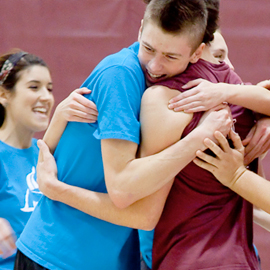Search for academic programs, residence, tours and events and more.
We've created nine two-minute videos covering everything you need to know about Laurier before deciding on where you should apply.
In this video, Ivan Joseph, Vice President of Student Affairs, talks about how we support you from the moment you accept your offer to Laurier. Whether you need support with your courses, physical or mental health, or life, we are willing and waiting to help you. Your success is our success!
Are you an international student? We've got a video series just for you!
You know what they say about all work and no play. We offer state-of-the-art fitness and recreational facilities where you can take fitness classes, participate in intramural sports or compete in varsity athletics.
Not interested in fitness? Work out your lungs by cheering our Golden Hawks to victory in the stands!
We use personalized mental health services and resources to respond to your unique wellness needs and empower you to support others effectively through peer-to-peer programs.
You can access physical health services from health-care professionals on campus.


Laurier is dedicated to creating a culture of inclusion, and because we truly value the diversity among our students, we recognize their unique needs.
Our Indigenous Student Centres (one on each campus) are not only places where Indigenous students can connect with their heritage, but are also places of education for the broader Laurier community.
The Centre for Student Equity, Diversity and Inclusion advocates for the equitable treatment of everyone, regardless of your gender, race, ethnicity, culture, sexuality, religion, age, ability or socio-economic background.
At Laurier, we are committed to fostering a university culture where gendered and sexual violence is unacceptable and is not tolerated. There are a range of supports available to survivors, which are responsive to their intersecting identities, lived experiences, and healing needs.